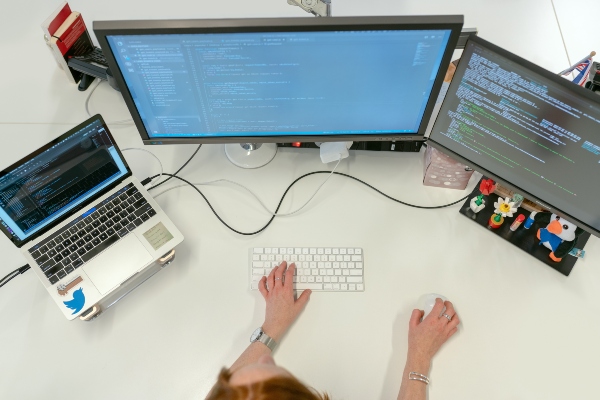Software engineering is a role that can involve a wide range of responsibilities, from project managing a team of developers to sharing your specialist knowledge on a particular type of application or program. Whilst certain industries may require some specific experience or ability, there are plenty of general skills that we have seen employers searching for when hiring software engineers.
In this article, we explain twelve of the top skills needed for software engineering, including both technical abilities and ‘soft’ qualities.

What is a Software Engineer?
A software engineer is a type of computer scientist who uses their expertise in this specific branch of the discipline to design programs, applications and of course, software. Their role involves creating, improving and maintaining software so that it performs certain functions or meets specific requirements.
In software engineering, principles from science, mathematics and general engineering are all combined to devise software solutions and new processes to solve problems in a range of industries. Software engineers might work in general roles where they develop new programs or contribute to the development of software packages, or they might specialise in a particular industry and just design software for specific devices or machinery. Embedded systems and electronics software engineers are an example of this specialised role.
Many people think that a software developer has the same role as a software engineer, but whilst some of the responsibilities of the jobs are the same, they approach projects from totally different perspectives. Software engineers tend to take a broader view of creating or updating software and will be more likely to work as a consultant or a project manager, ensuring that requirements are fulfilled, deadlines are met and efficiency is maximised.
Every role will be different depending on the industry and the level of responsibility you have, but typical tasks involved in a software engineer’s day-to-day work include designing and creating plans for new software, program or application development, evaluating and improving existing systems, writing up technical specifications, establishing test procedures and monitoring software performance.
6 of the Best Software Engineer Skills
A software engineer needs to have a good range of technical and practical skills in order to competently carry out all that is required of them. The role has its roots in maths and computer science as well as engineering, which means that most jobs require a wide range of different hard skills.
Programming and Coding
Programming and coding are perhaps the most wanted software engineering skills. Without the ability to write code and create programs and applications from scratch, you won’t be able to perform the majority of software engineering tasks.
Most software engineers are competent in several different programming languages, such as Python, Java, TypeScript and C++. Some roles may require you to learn specific coding languages to work on certain kinds of programs or projects, but these will be easier to pick up if you already have a background in learning code.
A lot of the information you need to build all kinds of software can be found online, and as a software engineer you’ll be working as part of a team who can share their ideas and experience when it comes to solving problems and starting projects from scratch. However, it will benefit you to have programming experience and the ability to write basic functions without any assistance, especially if you’re starting at a junior level.
Object-Oriented Design (OOD)
Object-orientated design is a software engineer skill that has become more sought after in the past decade or so. It refers to an approach to software development that involves thinking about a program through the lens of object-oriented design guidelines like abstraction and decomposition so that it is more flexible and can be easily reused.
Understanding OOD will make you very desirable as a software engineering candidate, and it is a skill that can be self-taught through various online courses and training resources.
Testing
Designing new software is only a small part of what a software engineer is responsible for. Every new program or system will have to be tested, refined and then tested again until it is decided that it meets certain requirements and standards, and understanding this test process is an important skill needed for software engineering.
You may need to design tests for the software you work with, as well as running them and identifying any errors or bugs that are uncovered. Whilst more and more companies are starting to use automation and AI software to carry out software tests, software engineers will still benefit from an understanding of these processes and some practical experience running them.
Debugging
After the testing stage, any issues or bugs that have been identified will need to be resolved. Debugging is a software engineering skill that requires analytical and lateral thinking to identify where a problem is coming from and how to remove it, followed by setting up protections that will minimise the chances of it happening again.
Debugging skills tend to come from experience, as each scenario is different and there is no single solution to fixing a problem in code.
Database Administration
Databases are a key part of the software and application development process. Almost every kind of software engineering project will involve some kind of interaction with a database, and being comfortable with navigating records and updating or modifying these will make the majority of jobs much easier. Employers are also likely to be looking for candidates who exhibit database administration skills, particularly those who can use SQL.
Software Development
This might seem like an obvious suggestion for essential skills needed for software engineering, but experience and understanding of software development and the software development lifecycle is an important part of the role. Knowing the correct procedures to follow and the stages required to conceptualise a piece of software from ideation to release is particularly important in more senior roles, which plenty of software engineering opportunities are.

Soft Skills Needed for Software Engineering
As well as the necessary technical skills needed for software engineering, there are also plenty of soft skills that are desirable in the role. These skills can be gained and developed through a range of experiences not necessarily related to software engineering, but will help in the day-to-day requirements of the role and make it easier to carry out the responsibilities involved.
Communication
Whilst a lot of software developers will spend time on their parts of a project individually, a software engineer tends to work more collaboratively with others for a lot of their role. Whether it’s liaising with a client to understand the requirements of a new piece of software or delegating tasks to a team of developers and programmers, good communication skills are vital to ensure that the right information is received and passed on.
As well as good verbal communication skills, which will ideally be supported by strong interpersonal skills and confidence, written communication skills are also a benefit for software engineers. Whether you’re producing technical specifications or a report on the testing and refinement process that you followed, being able to explain yourself clearly and comprehensively is very important.
Organisation
Organsation is a valuable skill in the majority of engineering roles, but as a software engineer you will often be responsible for overseeing an entire project or at least a significant portion of a software development process. Being able to keep track of everything involved in this, successfully deciding how to allocate time and resources and ensuring that every aspect of a project runs in synchronization will require very strong organisational skills.
Many software engineering teams use a form of agile working to coordinate the development of new projects and programs, which is an approach that will require you to be very self-organised and ensure that you keep on top of the tasks allocated to you and meet all the deadlines you are given.
Problem Solving
Problem-solving is one of the most wanted software engineering soft skills. From designing new applications to serve a specific purpose to debugging the software you have created and fixing problems in code, being able to look at a situation and devise ways to change the outcome is an essential part of a software engineer’s role.
Problem-solving not only needs a practical and analytical mindset, but it also requires creativity to look outside of the box and tackle the problem from different angles until a solution is found. You might need to do this collaboratively or on your own, stepping back from a situation and suggesting new approaches.
Teamwork
As we have already mentioned, the majority of software engineers work with a variety of other engineers and developers on projects, and so competent teamwork skills are a necessity. Being able to work well with others to get tasks done by communicating well, playing to your strengths and letting those with more experience take the lead will mean that the end product will always be high quality and the software development process will go smoothly.
Having good teamwork skills in software engineering means understanding where your talents lie and how best to use these with collaboration with others. If you’re in more of a leadership role, teamwork skills will be beneficial to motivate and connect with the people you are in charge of to create a positive team environment.
Attention to Detail
Software engineers are often differentiated from software developers because they tend to have a more general view of projects and spend less time working on individual sections of code or testing and refinement. However, a software engineer skill that is still very important is attention to detail, as this will ensure that potential problems don’t slip under the radar and cause major issues later on.
It isn’t easy keeping an overview of a project in your mind but still having the time to focus on the details, which is why this is such a sought after skill amongst employers. Being able to judge when to focus on something and when to let someone else manage a situation is an important part of being a successful engineer, and having the kind of mind that can switch between the two is very useful indeed.
Multitasking
Finally, the ability to multitask is one of the skills in software engineering that will make your experience of day-to-day tasks much easier. There is much more to the role than just sitting down and coming up with new ideas and ways to develop programs and applications for a range of systems and devices, and most days you may be required to get more than one thing done.
Multitasking means that you can hold multiple jobs in your brain at the same time and work on several tasks over a period of time so that they all get completed at around a similar point. It doesn’t mean putting in half of the effort to get twice as much done; it means organising your time incredibly efficiently to be as productive as possible.

Summary
From junior engineers who work in tandem with developers and programmers to create new pieces of software, to consultant software engineers who offer guidance on testing and debugging procedures, this is a role that can benefit from a wide range of specialist and general skills. Whether you’re a software engineering candidate or an employer looking to fill an engineering role, the above skills are all important to succeeding in the position and getting the most out of it as you can.
If you’re an employer in the embedded systems industry that is looking for specialist help with hiring software engineers, get in touch and find out more about how our recruitment agency can help you.







